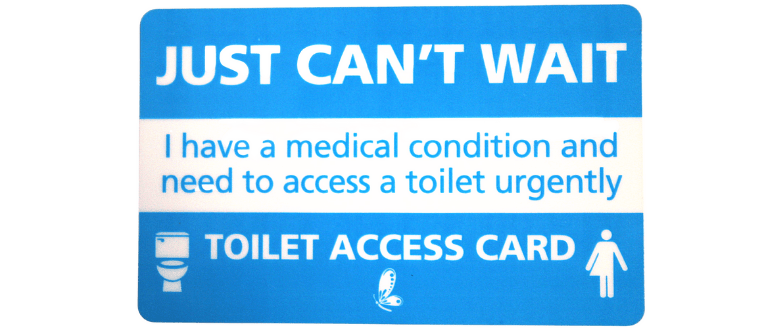The first World Toilet Day was on the 19th November 2001 and was initiated by the United Nations to raise awareness of the need to improve sanitation worldwide.
World Toilet Day recognises that not only do all humans need access to toilets, but those toilets need to be able to withstand climate change and keep communities healthy. Toilets have been with us for thousands of years, but despite innovation and recent technological advances, difficulties and inequities in access remain even in our own society.
COVID-19 and public toilet availability
There have been many media articles about toilet availability in the UK since the first lockdown was lifted in June this year. Once we were allowed to leave home for more than an hour a day, the closure of many public toilets due to Covid-19 became a regular feature of newspaper and radio articles and a cause of concern for many of us. Although motorway service stations remained open throughout, journeys and trips away needed to be planned more carefully. There were even pleas for us not to visit certain beauty spots, as toilets remained closed due to difficulties with keeping staff safe while cleaning and maintaining the required social distancing. Apps such as Lockdown Loo were launched, local councils and The Great British Toilet Map websites were widely consulted to find out where there would be facilities, if we needed to travel any distance, or spend any time away from home.
Accessible public toilets
At Bladder & Bowel UK we know that not everyone is able to access all public toilets. Many people with mobility issues need raised toilet seats, grab rails and other adaptations. These are provided in disabled toilets. However, there are people who need hoists and changing benches as well as more space than are available in most disabled toilets, to be able to access the community facilities that most of us take for granted. Changing Places launched their campaign to provide suitable toilets for those with more extensive care needs in 2006, aiming to have toilets that are accessible to those with the greatest physical needs, installed in all large public venues. As a result of a major overhaul to building regulations this year, Changing Places toilets will now have to be installed in all new large public buildings in England from 2021. It is hoped that this will make access to the community easier for many people across the UK and is a cause for celebration this World Toilet Day.
‘Just Can’t Wait’ cards

The team at Bladder & Bowel UK are aware that, even before the pandemic, reduction in the number of public toilets nationally due to funding difficulties, has had a
disproportionate impact on those with chronic bladder and bowel conditions. For this reason, Bladder & Bowel UK have started to provide a ‘Just Can’t Wait’ card to those affected by bladder or bowel conditions. While these cards do not guarantee toilet access, they are recognised by many retail and service organisations. They may make trips away from home easier for people who, due to medical reasons, have urgent need of a toilet. To apply for a card, which is the same size and shape as a credit card, email us at: bbuk@disabledliving.co.uk.
For more than two decades Bladder & Bowel UK have been providing advice and support to those with bladder and bowel health issues or additional toileting needs via the free downloadable information and the regular blogs featured on our website at www.bbuk.org.uk. There are relevant leaflets available for adults at https://www.bbuk.org.uk/adults/adults-resources/ and for children at https://www.bbuk.org.uk/children-young-people/children-resources/. We now offer a public electronic newsletter four times a year, which is full of interesting articles, suggestions and information for people affected by bladder and bowel conditions. To receive the newsletter, email us at bbuk@disabledliving.co.uk and ask to be added to the mailing list.
We also offer a confidential helpline to provide individualised support and signposting for people who are affected by bladder and/or bowel issues, for their families and carers and for the healthcare professionals who support them. This is available via email at bbuk@disabledliving.co.uk or on telephone number 0161 214 4591.


Comments are closed